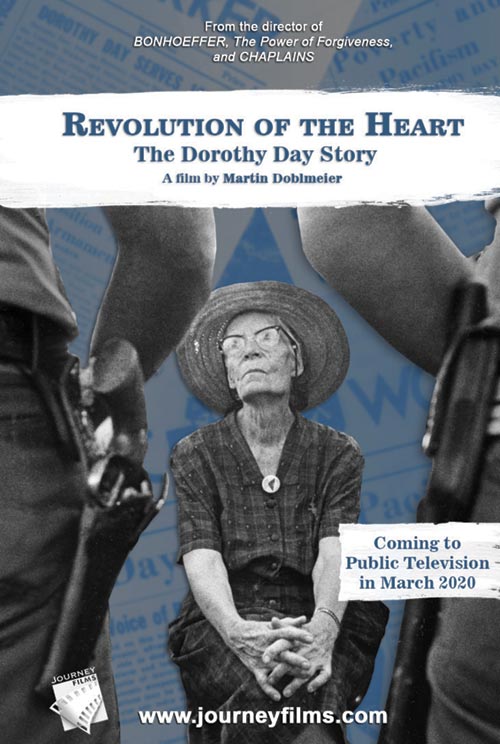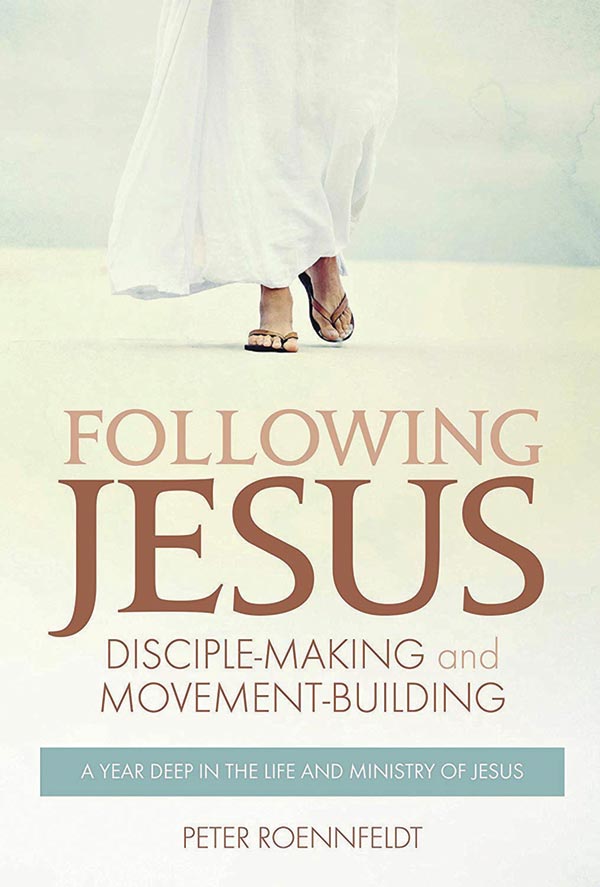
 Revolution of the Heart: The Dorothy Day Story, a film by Martin Doblmeier, Journey Films, 56 minutes, 2020. Reviewed by Stephen Chavez, Adventist Review.
Revolution of the Heart: The Dorothy Day Story, a film by Martin Doblmeier, Journey Films, 56 minutes, 2020. Reviewed by Stephen Chavez, Adventist Review.
In a joint session of the United States Congress in September 2015, four Americans were mentioned as those whose legacy benefited the country both socially and spiritually: Abraham Lincoln, Martin Luther King, Jr., Thomas Merton, and Dorothy Day. Someone who was in the chamber that day leaned over to a colleague and whispered, “Who’s Dorothy Day?”
Documentary filmmaker Martin Doblmeier has once again demonstrated his genius for profiling Christians who influenced American society for Christianity in the twentieth century. Revolution of the Heart, Doblmeier’s latest film, tells the story of a woman whose primary claim to fame was that she embraced the most basic—and radical—tenets of Christianity as enunciated in Jesus’ Sermon on the Mount. In the process Dorothy Day earned the ire of both the Archdiocese of New York and J. Edgar Hoover’s Federal Bureau of Investigation.
Dorothy Day (1897-1980) was born in New York City, and lived a bohemian lifestyle as a young adult, calling herself a Communist and believing that Communism would improve people’s lives. As a journalist, she covered workers’ rights and child labor.
After she became a parent, Day became a Christian and found Christianity—particularly the Sermon on the Mount—more radical than Communism. She, with a few others, established “houses of hospitality” that welcomed those who were poor and destitute, providing food and lodging for those who otherwise would have gone without.
Day found in Jesus’ words “blessed are the peacemakers” the motivation to be a fierce critic of military intervention from World War II to the war in Vietnam. She joined demonstrations to protest nuclear proliferation and was arrested several times.
Martin Doblmeier’s award-winning films have profiled such individuals as Dietrich Bonhoeffer, Reinhold Niebuhr, Jean Vanier, and Howard Thurman. His documentaries have also highlighted the power of forgiveness and the work of chaplains. Three of his documentaries have focused on the work and influence of Seventh-day Adventists. In 2019 Doblmeier received an honorary doctorate from Loma Linda University, Doctor of Humane Letters.
In addition to telling Dorothy Day’s story, Revolution of the Heart contains portions of interviews with Day’s granddaughters, Kate and Martha Hennessey; authors Joan Chittester and Jim Wallis; and actor/activist Martin Sheen. Revolution of the Heart will be broadcast on public television in March 2020 and is available for purchase from Journey Films (JourneyFilms.com/store) or Maryland Public Television (MPT.org/shop).
Dorothy Day famously said, “Don’t call me a saint; I don’t want to be dismissed that easily.” That statement is a reminder that sainthood is nothing more than putting one’s faith into practice.

Following the Apostles’ Vision: Recapturing Their Vision for Today, Peter Roennfeldt, Signs Publishing, 2019. Softcover, 247 pages, US$9.99 (Kindle edition). Reviewed by Stephen Chavez, Adventist Review.
Hindsight is always 20/20, or so it is said. Sometimes it’s only when we look back that we recognize patterns and pathways that contribute to our current situation. It may be the chief conceit of our age that we often feel obligated to reinvent what has happened before, with the idealistic assumption that we can improve on the past.
Church growth professional Peter Roennfeldt may have help for us. His latest book, Following the Apostles’ Vision, takes a hard look at the early Christian church, its challenges, and the ways the apostles met those challenges and turned Christianity into one of the most potent forces in world history.
To do that, Roennfeldt goes beyond dissecting the behaviors of the church as outlined in the book of Acts and unpacks the letters written to early congregations to see how they dealt with the issues that challenged them. His conclusion: the early church didn’t live in a vacuum, spending most of its time merely preserving orthodoxy in belief and practice. Rather, each congregation saw itself as an outpost to take the gospel to its own community, as well as to the larger world.
We often make heroes of the big names of the New Testament: Peter, James, Philip, John, Paul, Silas, and Barnabas. But the author shows that behind these missionaries and apostles, the early Christians who had the greatest influence in their communities were those who met regularly for meals, prayer, and fellowship. Indeed, this was the strength of the early church: not merely Paul’s sermons, but the congregations he left behind.
Along the way Roennfeldt dares to ask (and answer) this essential question: What is the church? While some still mistakenly think of the church as a building or an institution, the definition that comes closest to what was meant by the word “church” in the New Testament is “those who are called.” So the measure of a church’s success is not simply the number of members who attend services each week, how much in offerings it receives, or how many members join each month (or year), but how members influence their communities when they’re not attending services.
As with all of Roennfeldt’s recent books (Following Jesus, Following the Spirit, and You Can Make Disciples), Following the Apostles’ Vision contains excellent and practical thought questions in each chapter, making it easy for readers to imagine themselves touching others with the claims of the gospel, even when they’re not in church.